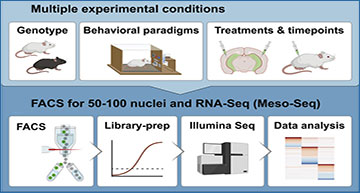Profiling of gene expression in sparse populations of genetically defined neurons is essential for dissecting the molecular mechanisms that control the development and plasticity of neural circuits. However, current transcriptomic approaches are ill suited for detailed mechanistic studies in sparse neuronal populations, as they either are technically complex and relatively expensive (e.g., single-cell RNA sequencing [RNA-seq]) or require large amounts of input material (e.g., traditional bulk RNA-seq).
Researchers at the Weizmann Institute of Science have developed Meso-seq, a meso-scale protocol for identifying more than 10,000 robustly expressed genes in as little as 50 FACS-sorted neuronal nuclei. They demonstrate that Meso-seq works well for multiple neuroscience applications, including transcriptomics in antibody-labeled cortical neurons in mice and non-human primates, analyses of experience-regulated gene programs, and RNA-seq from visual cortex neurons labeled ultra-sparsely with viruses. Given its simplicity, robustness, and relatively low costs, Meso-seq is well suited for molecular-mechanistic studies in ultra-sparse neuronal populations in the brain.
Apelblat D, Roethler O, Bitan L, Keren-Shaul H, Spiegel I. (2022) Meso-seq for in-depth transcriptomics in ultra-low amounts of FACS-purified neuronal nuclei. Cell Reports Methods [Epub ahead of print]. [article]





